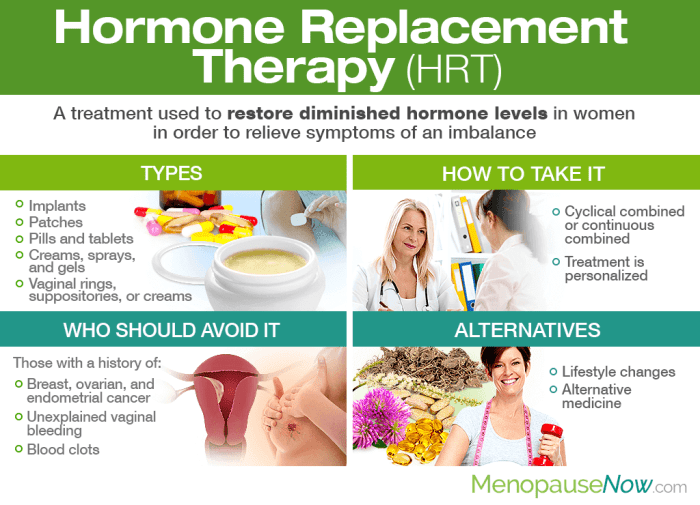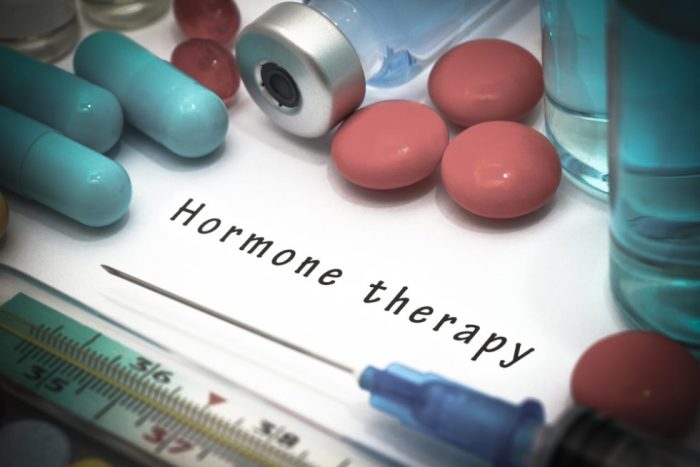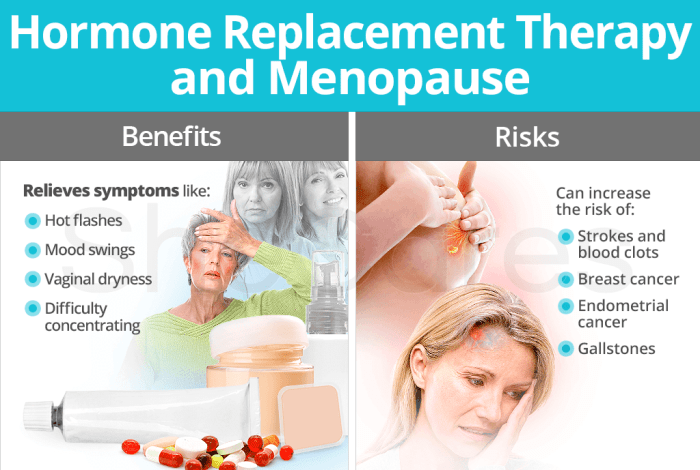Menopause hormone therapy (MHT) has emerged as a potential solution to alleviate the uncomfortable symptoms associated with menopause. In this article, we delve into the types, benefits, and considerations of MHT, providing a comprehensive overview to empower women in making informed decisions about their health.
MHT involves the administration of hormones, either estrogen alone or in combination with progestin, to mimic the body’s natural hormone production that declines during menopause.
Alternatives to Menopause Hormone Therapy

Menopause hormone therapy (MHT) is not the only option for managing menopausal symptoms. Several alternative treatments can provide relief without the potential side effects of MHT.
Alternative treatments for menopausal symptoms include lifestyle changes, acupuncture, and herbal remedies.
Lifestyle Changes
Lifestyle changes can help manage menopausal symptoms by reducing stress, improving sleep, and promoting overall well-being.
- Regular exercise can help reduce hot flashes and improve mood.
- Maintaining a healthy weight can help reduce the severity of hot flashes and other symptoms.
- Eating a healthy diet rich in fruits, vegetables, and whole grains can help reduce inflammation and improve overall health.
- Getting enough sleep can help reduce fatigue and improve mood.
- Managing stress can help reduce hot flashes and other symptoms.
Acupuncture, Menopause hormone therapy
Acupuncture is a traditional Chinese medicine technique that involves inserting thin needles into specific points on the body.
Acupuncture may help reduce hot flashes, night sweats, and other menopausal symptoms.
Herbal Remedies
Some herbal remedies may help relieve menopausal symptoms.
- Black cohosh is a herb that has been used for centuries to treat menopausal symptoms. It may help reduce hot flashes and night sweats.
- Red clover is a herb that contains isoflavones, which are plant-based compounds that have estrogen-like effects. Red clover may help reduce hot flashes and other menopausal symptoms.
- Dong quai is a herb that has been used in traditional Chinese medicine for centuries to treat menopausal symptoms. It may help reduce hot flashes and night sweats.
It is important to note that herbal remedies can have side effects and may interact with other medications. It is always best to talk to your doctor before taking any herbal remedies.
Recent Research on Menopause Hormone Therapy

Recent research on menopause hormone therapy (MHT) has provided new insights into its long-term effects and delivery methods, shaping the understanding and use of MHT.
Long-Term Effects of MHT
Long-term studies have shown that MHT can have both benefits and risks. While MHT can effectively relieve menopausal symptoms and protect against osteoporosis, it may also increase the risk of certain health conditions, such as breast cancer and blood clots.
However, the risks and benefits of MHT vary depending on the type of hormones used, the dosage, and the individual’s health history.
New Developments in MHT Delivery Methods
Researchers are exploring new ways to deliver MHT, such as through transdermal patches, gels, and implants. These methods offer several advantages over traditional oral MHT, including reduced side effects and improved compliance. For example, transdermal patches deliver hormones directly through the skin, bypassing the digestive system and reducing the risk of liver damage.
Final Conclusion

Understanding the potential benefits and risks of MHT is crucial for women considering this treatment option. By weighing the advantages against the considerations and discussing them thoroughly with their healthcare provider, women can make an informed decision that aligns with their individual needs and circumstances.
Ongoing research continues to shed light on the long-term effects and advancements in MHT delivery methods, further shaping our understanding and use of this therapy in managing menopausal symptoms.
Questions Often Asked: Menopause Hormone Therapy
What are the different types of MHT?
MHT is available in various forms, including oral tablets, transdermal patches, vaginal creams or rings, and injectable preparations.
Who is a good candidate for MHT?
Women experiencing moderate to severe menopausal symptoms, such as hot flashes, night sweats, and vaginal dryness, may benefit from MHT.
What are the potential risks of MHT?
MHT carries potential risks, including increased risk of blood clots, breast cancer, and heart disease. It’s essential to discuss these risks with a healthcare professional.